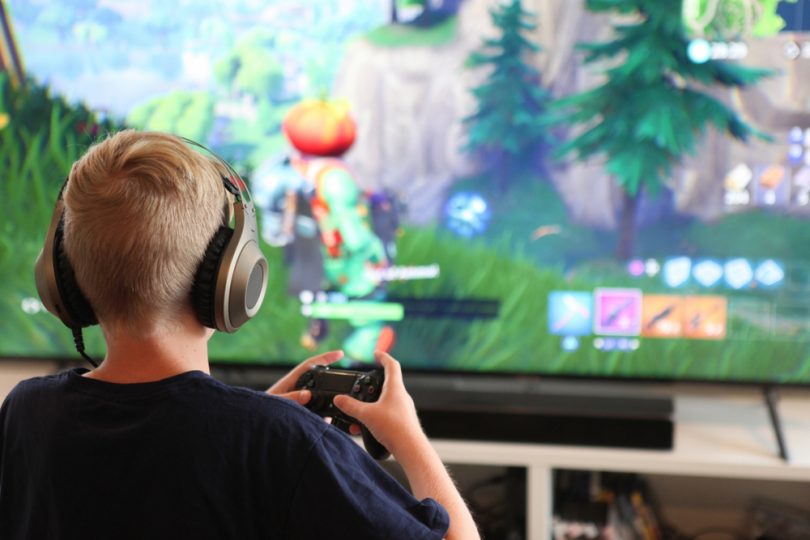Fortnite is the free-to-play battle royale game that pushed the genre from its explosively popular beginnings on the PC with PlayerUnknown’s Battlegrounds to a worldwide phenomenon on nearly every platform.
Everyone from little kids to middle school girls to musicians and athletes like Drake, Diplo, and Boston Red Sox pitcher David Price play Fortnite like it’s their job.
And for a certain class of YouTube and Twitch internet personalities, Fortnite is a job.
The game has created a whole new class of web celebrity that’s capable of blending live entertainment with competitive esports-quality performance.
The game is forcing game studios and publishers to rethink how their products are developed, monetized and updated over time.
The game made an estimated $300 million in April entirely on in-app purchases of items like costumes, dance moves and other cosmetics that do not affect your ability to compete.
The game has a significant amount of players who have not spent a single buck in the game, but they become a part of the game database which encourages other players to buy the in-app purchases to enhance their experience.
Fortnite’s free-to-play model, combined with the inherent popularity of the battle royale genre and Epic’s breakneck update cycle, has turned Fortnite into a mega-hit.
Now, nearly every big publisher is looking for ways to capitalize on the trend while trying to adapt at the same velocity as Epic.
Surprising Statistics
To see more clearly how Fornite impacted the technology industry let’s go over some statistics:
- 250 million Fortnite players in total (March 2019)
- 78.3 million Fortnite players in August 2018 – the single-month record
- Record for concurrent players stands at 8.3 million, recorded October 2018
- Fortnite reached 100 million iOS downloads within five months
- Launch of Fortnite Chapter 2 saw content delivery network Akamai’s traffic peaking at 106 Tbps – over twice the usual daily figure
- Newzoo find that 53% of Fortnite players were aged 10-25
- 62.7% of Fortnite players (excluding those younger than 18) are aged 18-24 according to one analysis, while another finds 45.75% fall into this age bracket
- The same two analyses found that either 72.4% or 83.7% of Fortnite players are male
- There were no female players at the Fortnite World Cup finals in July 2019
- 36% of Fortnite players consider themselves to be ‘core gamers’
- 53% of US Fortnite players don’t play any other major battle royale titles
- Median weekly time spent playing Fortnite stands at 6-10 hours
- In October 2018 Fortnite was viewed for 67.7 million hours on Twitch (the second-highest total), and 42.4 million hours on YouTube (the highest figure)
- In July 2018, 148 million hours of Fortnite were viewed on Twitch
- During that month, concurrent viewers numbered 205,259
- The average number of concurrent broadcasters peaked in January 2019, at 13,715
- A record number of concurrent Fortnite viewers was logged in October 2019, coinciding with the black hole event to mark the coming of Chapter 2, at 7 million
- Ninja counts 22.4 million YouTube subscribers,
- Tyler ‘Ninja’ Blevins and Drake’s team-up drew 635,000 concurrent viewers
- Ninja reportedly earns $500,000/month from streaming Fortnite over YouTube and Twitch
- Kyle Giersdorf, aka Bugha, is the biggest earner from tournaments, by his $3 million prizes for winning the Fortnite World Cup in July 2019
- $30 million in total handed out during the Fortnite World Cup, drawn from $100 million prize pot for 2019
- Fortnite World Cup concurrent viewership peaked at 2.3 million (YouTube and Twitch), with 14.1 million hours watched collectively during the final
- Throughout the whole Fortnite World Cup, 81.8 million hours of content were streamed
- 70% of Fortnite players have made in-game purchases, spending $85 each on average
- Total Fortnite revenue for 2018 is estimated at 2.4 billion
- Epic Games made a profit of $3 billion over 2018
- Epic Games valued at $15 billion in October 2018, up from $8 billion in July 2018.
This data shows the increasing popularity and revenue in the Fortnite era.
The gaming console, which was slowly getting out fashioned due to the mobile and pc gaming, has regained a lot of its popularity again due to the dedicated gameplay and control it provides for Fortnite.
Higher end phones with greater RAM saw some huge leap in sales as Fornite required a lot of ram for smooth gameplay.
This led to a lot of companies launching dedicated gaming phones.
And then there are various laptops which were tailored to the needs of games like Fornite and PUBG.
Now let’s take a look at how Fortnite changed the birthday party system altogether and brought exciting technology into it.

Fortnite and Birthday Parties
The best birthday parties are the ones that have strong themes—like your kid’s favourite book, TV show, or video game.
Not all movies or games translate well into birthday themes, but Fortnite does.
Arm your kids with boogie bombs and nerf guns, and they’ll be on the move for hours.
However, if you don’t play Fortnite yourself, finding the right supplies and decorations can feel intimidating.
Your home may also not have enough room for kids to reenact their gameplay—but that’s where we come in.
Premier mobile entertainment companies provide novel sports such as Fortnite Parties, Nerf War Party, Bubble Soccer and Archery Tag.
With these parties, both parents and kids get what they need: they won’t have to worry about a time-consuming setup and their child will get a memory that lasts a lifetime.
Technology and Increased Revenue
These were the major technological advancements that Fortnite brought about.
It ranges from simple pieces of tech devices like the gaming trigger controller for better gameplay in mobile devices to laptops that started being packed with a better and better graphics card.
Also, monitors offer a better frame-per-second rate for smooth video gameplay.


